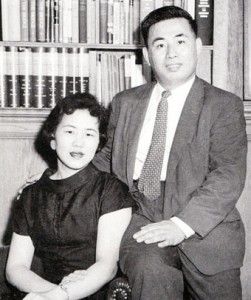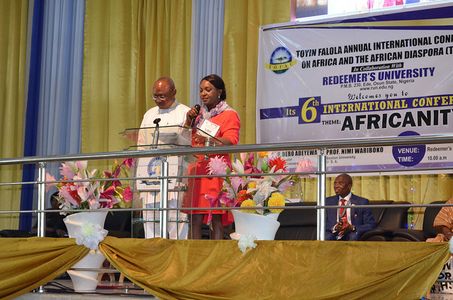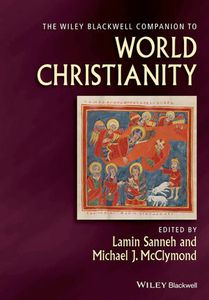Women and Christian Mission
Laura A. Chevalier, PhD candidate and CGCM student affiliate, has reviewed an important book exploring women and missions, Women and Christian Mission: Ways of Knowing and Doing Theology by Frances S. Adeney. Her review can be found in Missiology: An International Review 44, No.3 (July 2016): 362.
Dr. Nimi Wariboko awarded the Ali Mazrui Award
Dr. Nimi Wariboko, the Walter G. Muelder Professor of Social Ethics and CGCM faculty associate, was awarded the Ali Mazrui Award on July 4, 2016. The award was given by the Board of TOFAC (Toyin Falola Annual Conference on Africa and the African Diaspora) to scholars who have shown research excellence and distinguished scholarship. The award ceremony took place at the Redeemer’s University, Ede, Osun State, Nigeria where Dr. Wariboko was invited to deliver a keynote address titled “Constructing Africa’s Greatness: The Neglected Path of Community, Narratives, and Care of the Soul.”
Yale-Edinburgh Group Report
The Yale-Edinburgh Group held its meeting at New College, the University of Edinburgh from June 23 to June 25, 2016. The theme of this year’s meeting was “Responses to Missions: Appropriations, Revisions, and Rejections.” Approximately eighty global scholars gathered for the meeting.
This year, two CGCM students presented their papers at the meeting. Laura Chevalier, Ph.D candidate at the Boston University School of Theology, gave a presentation on her paper, “Spirit-Filled homes and kids: how nurture and revivals at Mukti mission schools and Assiout orphanage contributed to the spread of global Pentecostalism,” and Younghwa Kim, M.Div graduate, presented his research on “Ahmadi Muslims’ response to Christian missions in Northern India and the expansion of Ahmadiyya in Africa."
Dr.Koh Hyeseong recognized as an Outstanding American by Choice

On July 19, 2016, Dr. Koh Hyeseong-Cheon will be recognized as an Outstanding American by Choice by the U.S. Department of Homeland Security for her achievements and contributions as a naturalized citizen. Senator Richard Blumenthal and other representatives of the government will speak at this event. She is the first Korean American to receive this recognition. Dr. Koh received a Doctorate degree in Sociology and Anthropology from Boston University in 1959. She is a co-founder of the East Rock Institute in New Haven, Connecticut (1952-) and her leadership was acknowledged through her reception of the Prime Minister’s Award in South Korea (1990), the Korean Broadcasting Society Overseas Korean Compatriot Prize in South Korea (2000), the Connecticut Governor’s Award (2003), and the Order of Civil Merit in South Korea (2007). More description of her achievements can be found at the Boston Korean Diaspora Project website.
Hunter Mabry, American Sociologist and Missionary
 Dr. Hunter P. Mabry, teacher, sociologist, and missionary, passed away on July 9, 2016, after a long struggle with chronic radiation damage. Mabry obtained his Doctorate in Sociology of Religion and Social Ethics at the Boston University School of Theology in 1969 and had taught and mentored hundreds of students under the United Methodist Board of Global Ministries and the United Theological College in Bangalore, India. His memorial service was held on July 16 at the Jesus the Redeemer Church, Roanoke, Virginia. Full tribute can be found here.
Dr. Hunter P. Mabry, teacher, sociologist, and missionary, passed away on July 9, 2016, after a long struggle with chronic radiation damage. Mabry obtained his Doctorate in Sociology of Religion and Social Ethics at the Boston University School of Theology in 1969 and had taught and mentored hundreds of students under the United Methodist Board of Global Ministries and the United Theological College in Bangalore, India. His memorial service was held on July 16 at the Jesus the Redeemer Church, Roanoke, Virginia. Full tribute can be found here.
A Methodological and Demographic Analysis
Gina Zurlo, PhD candidate and student affiliate of the CGCM, and Todd Johnson, Associate Professor of Global Christianity at Gordon-Conwell Theological Seminary, recently published an article “Unaffiliated, Yet Religious: A Methodological and Demographic Analysis.” The article appeared in the Annual Review of the Sociology of Religion and is available online here.
Call for Papers: Dynamics of Missionary Knowledge
Mapping Entanglements
Dynamics of Missionary Knowledge and “Materialities” across Space and Time (16th - 20th centuries)
February 9-11, 2017
Workshop at the German Historical Institute in Washington, DC
Conveners: Sabina Brevaglieri, Elisabeth Engel in collaboration with the History of Knowledge Research Group at the GHI Washington and the German Historical Institute in Rome
In recent years missionary knowledge has emerged as an experimental category for scholarship, residing at the intersection of different historical and scholarly fields and shaped by all of them, such as the social and cultural history of missions, imperial history, history of science, and intellectual history. This new analytical focus fosters better understanding of the various meanings of knowledge and the specific nature of how it is made in relation to the missionary commitments of different religious communities. At the same time, the study of missionary knowledge underpins a subtler understanding of the missionary as an “actor between two worlds.” While a “duty of knowledge” of people, languages, and territories targeted for evangelization can be considered integral to apostolic practice, the missionary cannot be reduced to a privileged agent in the making of an institutional body of knowledge. The production, circulation, and accumulation of missionary knowledge are to be regarded as closely intertwined with religious experiences, oriented towards a personal engagement in the local field. However, knowledge-making shapes complex and multipolar configurations across colonial spaces imbued with competition and conflicts. An analytical focus on missionary knowledge, thus, appears to be a powerful tool for reflecting on the relationships between power and religion. It provides a sensitive ground for launching an “entangled history” project from a longue durée perspective as it is able to address a highly fragmented and instable bulk of evidence scattered and mostly unexplored in archives, libraries, and museums throughout the world.
“Mapping entanglements” is here, first of all, understood as a dynamic tool for overcoming the artificial epistemological divide between Europe and the colonial empires. Along this line of thinking, the workshop sets out to investigate paths and configurations of missionary knowledge within dynamics of continuity and change, going beyond the boundaries of traditional periodization, as well as challenging the logic of homogeneous cultural areas. Shifting “knowledge collectives” made by people, institutional actors, textual and visual “writings,” such as maps, as well as things, account for the constitutive epistemological plurality of missionary knowledge, as well as for its strongly negotiated nature. Within such knowledge aggregates, writings emerge as complex translations of missionary experiences and transcriptions of a plurality of voices and agencies that contribute to shaping them. Material evidence too, however, provides insight into multiple ways of knowing as they meet and coalesce in an object. It articulates networks of mutual dependencies, in which agency is not homogeneously distributed but reshaped through asymmetrical interactions wherein contingencies and shifting positions within a web of spatial and temporal connections remain invisible to the master narrative of colonialism. Within this framework, missionary knowledge as a field constitutes a fresh perspective for looking at Europe within the shifting global dynamics of centralities and decentralities, as well as for questioning Europe’s essentialist relationship with Christianity, opening up the possibility of reevaluating comparisons between the Protestant and Catholic worlds.
“Mapping entanglements” is also a tool well-suited to addressing the enormous spans of spatial and temporal links in which “things” are entrapped. In engaging with the complexity of missionary knowledge, the workshop invites participants to explore the conceptual divide between verbal communication and materiality beyond a classical dualistic approach. Writings, as a communicative form of knowledge, and things do not have to be viewed as opposites, nor necessarily regarded as homogeneous, and distinctions should not be erased. From the perspective of missionary knowledge, however, both the study of writings and of objects can be approached by evaluating their performative dimension, beside and beyond the representational one. We therefore regard the material “presence” of different kinds of knowledge artifacts, whether copies of published books in libraries, writings stored in archives, or objects in museum collections, as having an active historical dimension, since they are not completely separated from the contingencies in which they were produced and received. The workshop plans to shed light on the relationships between their uses, situational contexts, and shifting hierarchies of relevance. By taking into account the meanings attached to the making and conservation of sources, contents – and silences too – acquire new meanings, and discarded agencies acquire new visibility.
Potential topics include, but are not limited to:
- Writings and images as spaces of entanglement: religious traditions and missionary knowledge
- Crossing boundaries: paths of missionary knowledge between manuscripts and book cultures
- Writings and agency: missionary knowledge in invisible and visible spaces
- Missionary knowledge dynamics: archives as spaces of interaction and negotiation
- Embodied missionary knowledge: writing and consuming material culture across spaces and times
- Missionary exhibitions and museums: the making of the order of knowledge
At this level, the workshop’s interdisciplinary scope clearly intertwines with the transnational and global dimension, underpinning the ongoing discussion at the GHI of the high potential of the history of knowledge as an analytical focus supporting reflexivity of historical work, as well as creative dialogue within and outside other historical disciplines.
Funding is available to cover travel expenses. Please send paper proposals (around 250 words and a short bio) to Susanne Fabricius (fabricius@ghi-dc.org) by June 30, 2016. Notifications of acceptance will be delivered by the end of July. For any questions, please contact Sabrina Brevaglieri (brevaglieri@ghi-dc.org).
Indigenous and Vernacular Christianity
Eva M. Pascal, Michèle Sigg, and Gina Zurlo recently contributed a chapter "Indigenous and Vernacular Christianity" in the Wiley-Blackwell Companion to World Christianity, a collection of essays exploring a range of topics relating to the spread and influence of World Christianity. Their chapter examines indigenous and vernacular Christianity in Asia, Africa, and Latin America. They argue that indigenous and vernacular Christianity is a primary component in the global expansion of Christianity. The volume is edited by Lamin Sanneh, the D. Willis James Professor of World Christianity and of History at Yale University, and Michael McClymond, Professor of Modern Christianity at Saint Louis University. You can find the book here.
Korea Research Institute for Mission

Daewon Moon, Doctoral Fellow at the CGCM, was recently appointed as a visiting researcher at the Korea Research Institute for Mission (KRIM). He is involved in a project to develop training materials for Korean missionary candidates under the leadership of the renowned Korean missiologist Dr. Steve Moon, who is contributing editor of the International Bulletin of Missionary Research. Daewon is also supporting KRIM’s annual missiological forum and seminar. Following a year and a half of mission work at International Leadership University in Burundi, he and his family have temporarily relocated to Korea due to political instability in Burundi.
A Global Church Divided?
The Atlantic ran an article on the challenge of being a global church. In an interview with CGCM Director, Dana Robert, the magazine explored the complexity of holding together a diverse body with an essentially democratic polity. Currently, the United Methodist Church is struggling with the question of whether gay and lesbian people can be ordained in the church, and whether or not pastors can marry same-sex couples. The questions threaten to divide the church. Yet, Robert saw the current debate as hopeful: “You don’t see Catholic bishops debating these issues with the laity. Their position is set. You don’t see fundamentalists debating this issue with the laity. Their position is set." But for Methodists, if “you believe in the unity of the church … struggle is part of the process.”



